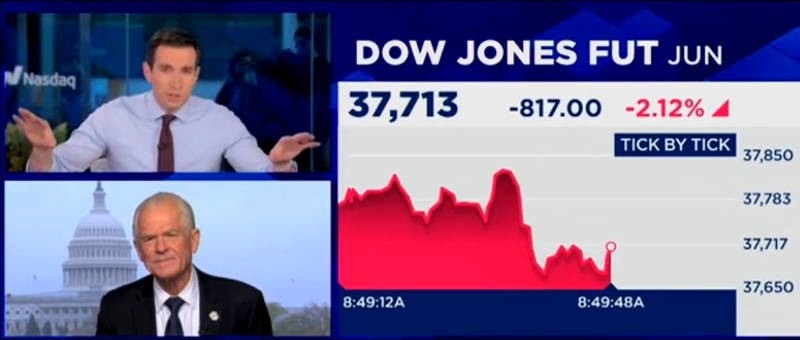Trump trade adviser Peter Navarro sparred with CNBC’s “Squawk Box” hosts on Monday over whether the administration’s reciprocal tariffs will ultimately lead to successful negotiations with foreign countries. Navarro argued that the nations targeted by the new tariffs engage in unfair trade practices by providing “heavy export subsidies,” interfering with U.S. markets, and imposing steep taxes.
CNBC’s Andrew Ross Sorkin, appearing skeptical about the tariffs, observed that President Donald Trump’s goal of generating revenue and negotiating with foreign nations seems “to be at odds with each other.” He added: “Just stick with me for a second. Either we can collect those revenues and by the way, there’s other people who think it will be a tax on the American people, but, let’s just put that aside and assume that you can collect revenues. Either you’re collecting revenues and that’s the goal, or you’re negotiating with these countries to get to not to 0% it sounds like anymore, but something very different than that. But those two goals seem to be at odds with each other.”
“Not if you look at it as a movie rather than a snapshot, Andrew. The goal here, ultimately, is to have people make things here. Remember, the president has said early on, hang on, let me finish a thought,” Navarro said as Sorkin interrupted. “Andrew, why are you interrupting? Let me just finish a thought.
“The president has said very early on, often, that the best way to avoid tariffs is to just come here and produce. I mean, if you look at our auto industry, we’re an assembly line for German engines and transmissions right now. That just doesn’t make any sense. In World War II, we won that war with our so-called arsenal of democracy. We can’t do that anymore. We’ve got parts spread all across the globe and if COVID taught us anything, those supply chains aren’t not resilient, they’re not reliable. So, I take your point, but I’ll tell you. We’re gonna get to a place where America makes stuff again,” Navarro continued.
The Trump administration implemented the tariffs with the dual goal of bringing manufacturing jobs back to the U.S. and securing more balanced trade agreements with foreign nations. In February, President Trump announced 25% tariffs on imports from Mexico and Canada, citing their roles in exacerbating the illegal immigration crisis and the fentanyl epidemic in the United States.
The pressure from the tariffs prompted former Canadian Prime Minister Justin Trudeau and Mexican President Claudia Sheinbaum to meet the president’s demands on border security. Trudeau committed billions to fortify Canada’s border and appointed a “Fentanyl Czar,” while Sheinbaum deployed 10,000 National Guard troops to the U.S.-Mexico border.



